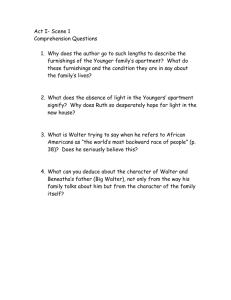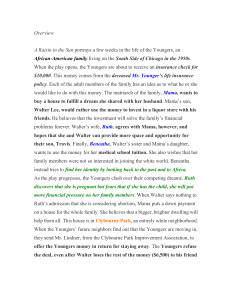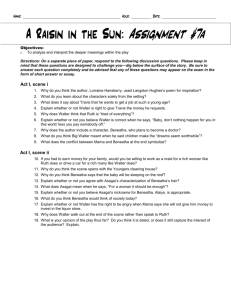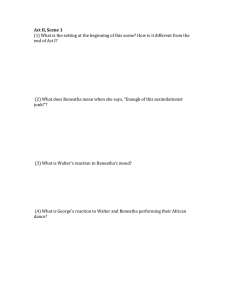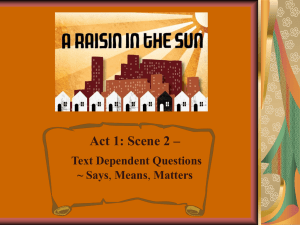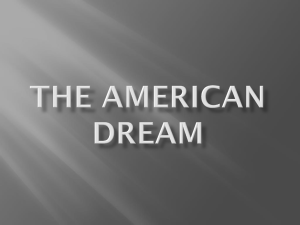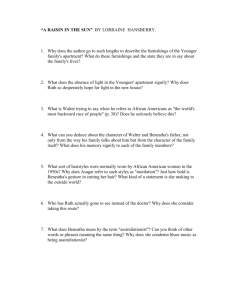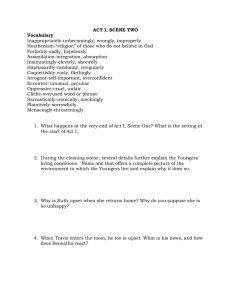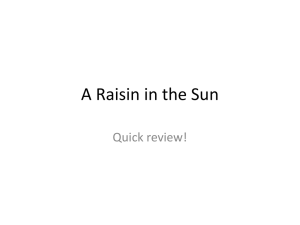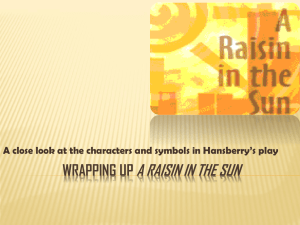Name_________________________________________
advertisement
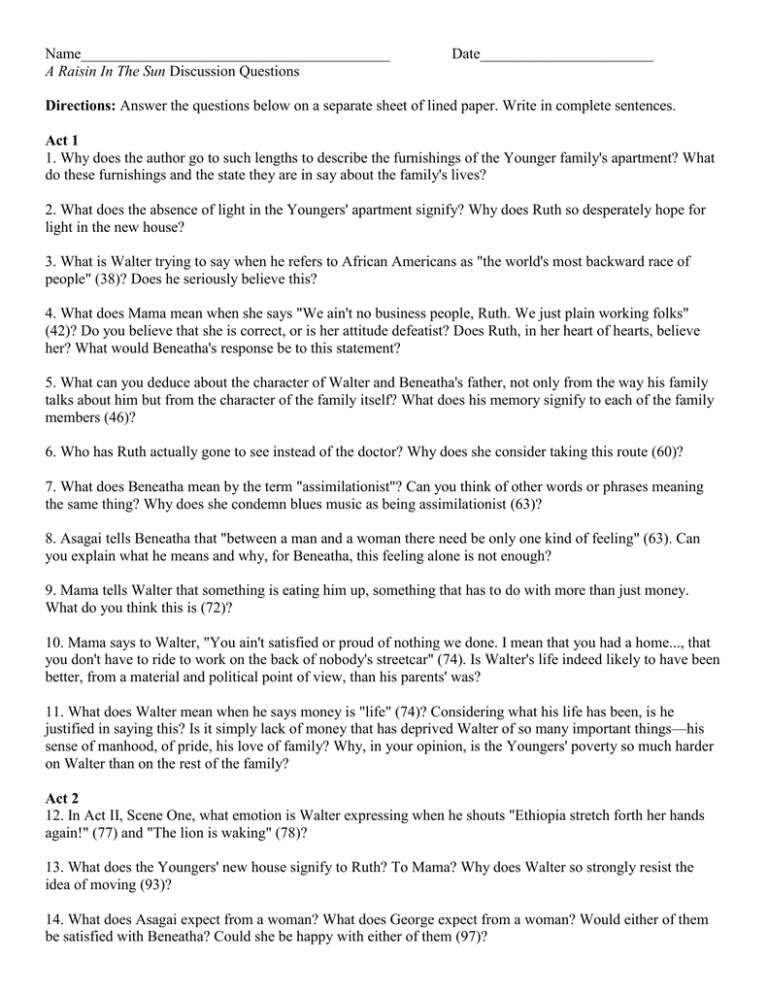
Name_________________________________________ A Raisin In The Sun Discussion Questions Date_______________________ Directions: Answer the questions below on a separate sheet of lined paper. Write in complete sentences. Act 1 1. Why does the author go to such lengths to describe the furnishings of the Younger family's apartment? What do these furnishings and the state they are in say about the family's lives? 2. What does the absence of light in the Youngers' apartment signify? Why does Ruth so desperately hope for light in the new house? 3. What is Walter trying to say when he refers to African Americans as "the world's most backward race of people" (38)? Does he seriously believe this? 4. What does Mama mean when she says "We ain't no business people, Ruth. We just plain working folks" (42)? Do you believe that she is correct, or is her attitude defeatist? Does Ruth, in her heart of hearts, believe her? What would Beneatha's response be to this statement? 5. What can you deduce about the character of Walter and Beneatha's father, not only from the way his family talks about him but from the character of the family itself? What does his memory signify to each of the family members (46)? 6. Who has Ruth actually gone to see instead of the doctor? Why does she consider taking this route (60)? 7. What does Beneatha mean by the term "assimilationist"? Can you think of other words or phrases meaning the same thing? Why does she condemn blues music as being assimilationist (63)? 8. Asagai tells Beneatha that "between a man and a woman there need be only one kind of feeling" (63). Can you explain what he means and why, for Beneatha, this feeling alone is not enough? 9. Mama tells Walter that something is eating him up, something that has to do with more than just money. What do you think this is (72)? 10. Mama says to Walter, "You ain't satisfied or proud of nothing we done. I mean that you had a home..., that you don't have to ride to work on the back of nobody's streetcar" (74). Is Walter's life indeed likely to have been better, from a material and political point of view, than his parents' was? 11. What does Walter mean when he says money is "life" (74)? Considering what his life has been, is he justified in saying this? Is it simply lack of money that has deprived Walter of so many important things—his sense of manhood, of pride, his love of family? Why, in your opinion, is the Youngers' poverty so much harder on Walter than on the rest of the family? Act 2 12. In Act II, Scene One, what emotion is Walter expressing when he shouts "Ethiopia stretch forth her hands again!" (77) and "The lion is waking" (78)? 13. What does the Youngers' new house signify to Ruth? To Mama? Why does Walter so strongly resist the idea of moving (93)? 14. What does Asagai expect from a woman? What does George expect from a woman? Would either of them be satisfied with Beneatha? Could she be happy with either of them (97)? 15. Why does Mrs. Johnson say that the Youngers are proud? Does she mean it as a compliment? Are they, in fact, proud? How does pride help, or hinder, them in their progress through life (102)? 16. Though three of them work as servants, Mama and her family believe that "being any kind of a servant wasn't a fit thing for a man to have to be" (103). This belief goes against one that, because of Booker T. Washington's influence, had value in the black community at that time: that all labor was possessed of dignity. Do you side with Mama on this issue, or with Washington? What are your reasons? Is this purely a racial matter, or is it a problem which all races must solve? 17. Can you explain what Beneatha means when she says that "there are two things we, as a people, have got to overcome, one is the Ku Klux Klan—and the other is Mrs. Johnson" (104)? 18. How does Lindner use language to make his proposal to the Youngers sound almost like a reasonable one? Is it true that "a man, right or wrong, has the right to want to have the neighborhood he lives in a certain kind of way" (115)? Is a "right" actually a right when it infringes on the rights or ignores the humanity of others? 19. Does Walter's failed investment confirm Mama's belief that the Youngers are not businessmen but plain working folks (130) ? Act 3 20. Why is Mama's little plant so important to her? What does she mean when she says "It expresses ME" (121)? 21. After he has been robbed, Walter says that life is divided "between the takers and the 'tooken'" (141). Do the final events of the play prove him wrong? If so, how? 22. What does it mean, to Walter, to be a "Man"? Final Discussion Questions 1. Beneatha declares that she is searching for her "identity." In what does her search consist? Does she find it, at the end of the play? 2. Is God a real presence to any of the characters besides Mama? Does Mama's religion give her strength, or is the strength already in her character? Does Beneatha's rejection of her mother's God make her stronger, or more vulnerable? 3. Many of the problems the Youngers must confront are specific to the African American family; others are problems that every family, black or white, must deal with. What in the play do you see as specifically African American, and what is universal? 4. Through most of the play, Walter is shown in a state of arrested development, still very much like a teenager. Do you feel, as Mama comes to, that because for many years she refused to cede the position of head of the family to him, she is to blame for the deficiencies in his character? 5. In answer to someone who thought the play's ending was a happy one, Lorraine Hansberry retorted: "I invite him to come live in one of the communities where the Youngers are going!" (11) But cannot the ending, in some measure, be seen as happy? Or at least as promising hope, or greater strength for the Youngers as a family?
